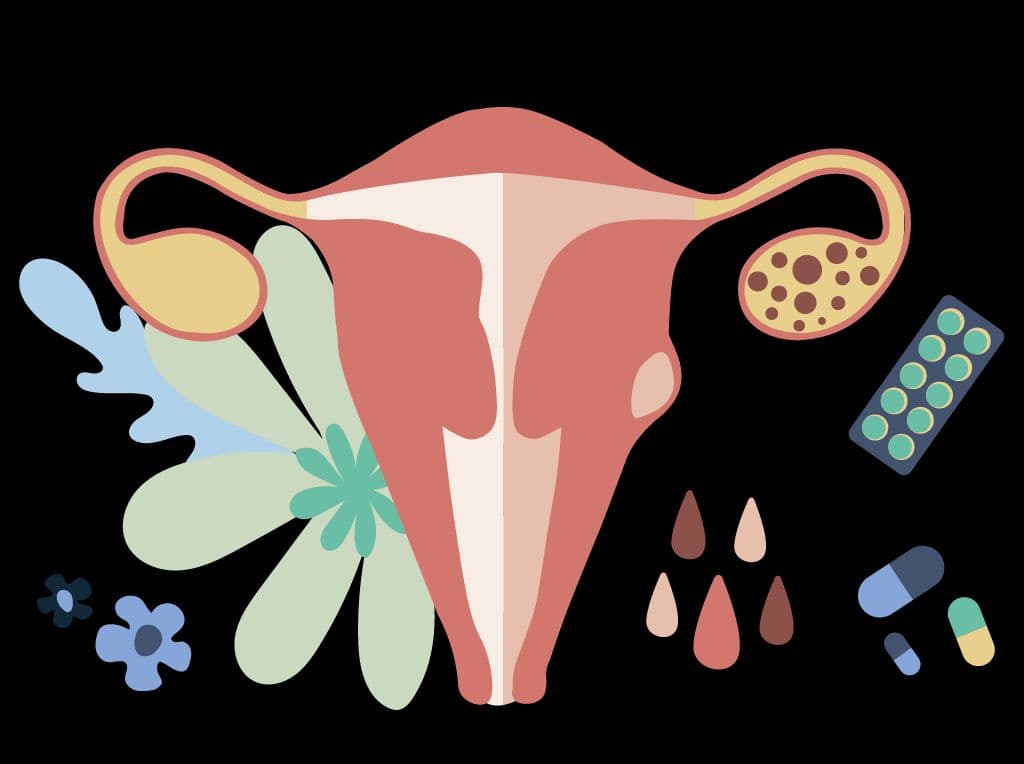This article is compiled by Sanjana Varma, a freelance writer at Proactive For Her.
PCOS is a hormonal condition and a lifestyle disorder that affects menstruators of mainly childbearing age. PCOS affects the functions of your hormonal reproductive organs and is ranked as the primary cause of infertility in women worldwide. PCOS can affect people of all sizes irrespective of the popular belief that only people with obesity can get PCOS.
PCOS could lead to:
- disrupts the menstrual cycle
- is associated with no ovulation ( no release of an egg from an ovary)
- leads to immature growth of eggs
- causes weight gain
- an increase in weight may lead to insulin resistance
PCOS and pregnancy
PCOS may lead to disruption of your menstrual cycle. People with PCOS miss periods (amenorrhea) or have them irregularly. This may make calculating your ovulation days difficult or even impossible. Another effect of PCOS is weight gain which can lead to insulin resistance. To be frank, it is difficult for you to get pregnant with uncontrolled PCOS. Proper medication, lifestyle changes and fertility assistance will help you embrace parenthood.
How to get pregnant naturally with PCOS?
It might seem difficult to conceive naturally with PCOS, but it is not impossible.
The first step is to diagnose the condition and start treatment. Your doctor may advise lifestyle changes like exercise and diet to help regularize your menstrual cycle.
Here’s what your doctor may suggest
- Weight management to restart ovulation
Some people may struggle with weight loss especially if they have PCOS. Insulin resistance is the culprit here which promotes weight gain. This in turn may lead to anovulation ( no ovulation). Some studies have shown that reducing 5-10% of weight can help restart ovulation and quickly increase your chance of getting pregnant.
- Fertility-friendly diet and exercise
A low-carb diet is found to be beneficial for PCOS related infertility. Avoiding refined food ( refined oil, refined sugar, refined wheat) is a must. Stay away from junk food and carbonated drinks. Switch to whole foods rich in proteins and vitamins. If you can, have a bigger balanced breakfast and a smaller dinner. Seek the support of your nutritionist to set a diet plan that makes your weight loss journey feel like a blessing.
Exercise can work wonders for your body. Starting is always difficult. Sign up for free trials and understand what works for you. Yoga, pilates, gym, swimming, boxing, your options are numerous. Pick an activity that excites you and this in turn will make sure you never miss out on a session.

How to get pregnant quickly?
Lifestyle changes alone may not work for everyone with PCOS. If you are looking for a quicker way to get pregnant with PCOS, your doctor may suggest some medications that will tackle your symptoms and increase your chance of getting pregnant fast. Consulting a fertility specialist will help you to get pregnant fast.
These are the commonly prescribed medications for getting pregnant with PCOS:
- Metformin is a drug given to individuals who have diabetes and have insulin resistance. Menstruators with PCOS are prone to being diagnosed with diabetes which may also affect your pregnancy. It is sometimes prescribed to people with PCOS even if they don't have insulin resistance. Taking the drug alone will not help you. Please ensure you will stick to the diet and exercise regime as well.
- Clomid is another fertility drug. Clomid is sometimes used in combination with Metformin to promote pregnancy as some may have Clomid resistance.
- Letrozole/Femara is a drug that may work for you if the previous ones don't. Originally a cancer medicine, it is found to stimulate ovulation in people with PCOS.
- Gonadotropins are injectable fertility drugs. This is a combination of hormones of Follicle Stimulating Hormone and Luteinizing Hormone.
Anyone or a combination of these may help improve your fertility. These fertility drugs should be prescribed only by fertility experts as the drug dose varies from person to person and overindulgence might lead to serious side effects
Who should go for fertility procedures for getting pregnant with PCOS?
If fertility medications and lifestyle changes didn’t work for you, you should try fertility procedures. Although expensive, fertility assistance has proved helpful to many parents. Here are a few procedures for you:
- In vitro fertilisation (IVF) is a complex series of procedures wherein mature eggs are collected from ovaries and fertilised by sperm in a lab. Then the fertilised eggs (embryos) are transferred to a uterus. One full cycle of IVF takes about three weeks.
- In vitro maturation (IVM) is another procedure where the oocytes from the females are collected and matured in vitro before transferring to the uterus. It is beneficial for people with ovulation problems.
- Intrauterine Insemination (IUI) is a type of artificial insemination in which sperm is injected directly into your uterine cavity near the time of ovulation. The sperm used can be from your partner or any healthy donor.
All these procedures have a significant success rate. Consult your doctor and make an informed decision on which method suits you best.
How to detect pregnancy with PCOS?
Getting pregnant is very stressful. You need to know your fertility window to start with. In the case of people with PCOS, this is something that needs to be taken care of first. Your priority will be to regularise your periods with lifestyle changes and medications.
Here’s a step by step guide for you to detect pregnancy:
- Figure out your fertility window: The length of your menstrual cycle is the number of days from the first day of bleeding in your last period, to the first day of bleeding in your next. It is usually 20-35 days. From this figure, subtract 14 days from the end of your current cycle to determine the approximate day you ovulate and let your partner know. If you have irregular periods, you may use an ovulation strip to detect your fertility window and increase your chance of getting pregnant.
- Wait for your periods: If you don’t get periods even after a month, use the home pregnancy detection kit to see if you are pregnant. Make sure to notice any new symptoms like tiredness or aversion to certain foods. For people with PCOS, it may not always be a pregnancy that causes the period gap.
- Consult your doctor: If you have got a positive result, seek the help of your doctor. They may order further tests to confirm pregnancy and assess the health of the embryo.
If you can’t get the exact fertility window, make sure you make an informed guess. You may seek your doctor’s advice who will fill you in on ways to understand it.
Is pregnancy possible with PCOS?
The short answer is yes. PCOS will make you childless is a myth that the world of medicine has busted. PCOS patients have welcomed their young ones with proper care and treatment. The success rates of PCOS pregnancy are very high.
Earlier the diagnosis, the earlier you can get pregnant. PCOS condition is manageable. Your symptoms and health determine your treatment plan. You may be advised to stop trying to conceive until your menstrual cycle is better. Lifestyle changes and medication will prepare your body for pregnancy. Once you start ovulating, it’s time for you to try conceiving.
Some people may even conceive naturally while some need fertility assistance. Either way, it is possible to conceive with PCOS. You may not get pregnant on the first try but follow your treatment plan and note your fertility window. Please prepare yourself for false-positive detections. Don’t lose heart, many of us have been down this road.
Kiss stress goodbye
Research has shown that stress can have negative effects on fertility. Be it work pressure or personal issues, it can lower your chances of getting pregnant. It can be a double whammy for a person with PCOS.
Stress can push people toward unhealthy behaviours such as:
- sleeping a lot
- unhealthy diet
- no physical exercise
- drinking or smoking habit
- caffeine dependence
- sleep-deprivation
- lack of interest in sex
Any of these factors can cause infertility. It’s important to reevaluate your lifestyle and make necessary changes. PCOS is a lifestyle disease that can take a severe form of stress added to the equation. Ensure you get enough sleep and go for wholesome diets. Slowly lower your alcohol, cigarette and caffeine intake. Rekindle your sex life and find ways to dissolve stress. Stress itself may not be the cause of your infertility but it can be a factor.
Getting pregnant with PCOS can be an emotional rollercoaster
Fertility issues can come as a real shock if you are planning to have a child. Feelings of guilt and failure are very common. First of all, don’t hold yourself responsible for it. Take this as a medical problem that can be fixed. A change in perspective can work wonders. You may speak with your doctor and get a clear idea about the procedures, procedural success rates and what is suitable for you. Remember it can take some time to get pregnant with PCOS. It can be stressful for both partners. Support each other and be open to communication. Reach out to therapists or friends who can help you further. As they say, good things take time.
Disclaimer - This information is educational and should not be construed as medical advice. Please consult your doctor before making any dietary changes or adding supplements.
ProactiveForHer is a digital clinic for women, offering accessible, personalised, and confidential healthcare solutions. We offer out-patient care, diagnostic services and programs for various health concerns of Indian women, across their lifetime - from puberty to pregnancy to menopause.

